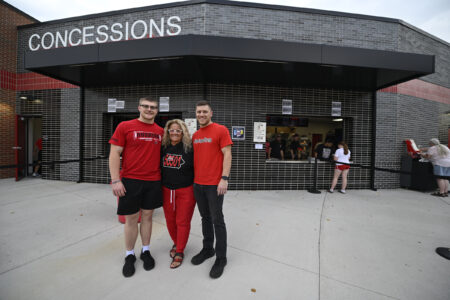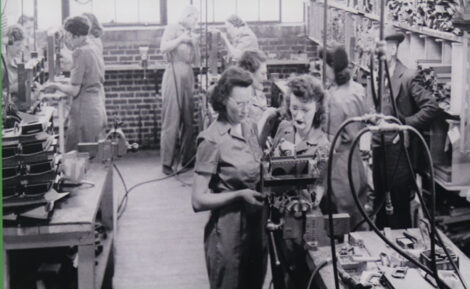Patience goes long way toward harvest safety
Patience goes long way toward harvest safety
Don’t overlook the small things at harvest time. Accidents lurk in simple places. And many of them can be avoided if farmers slow down and do the things they already know to be doing in order to stay safe.
“During harvest, everybody is in a hurry,” said Steve Freeman, of Iowa State University, whose work focuses largely on farm safety issues. “Everybody is stressed during harvest season.”
Farmers need to take care of themselves the same way they care for their farm equipment.
Freeman is an on-campus professor of agricultural and biosystems engineering at Iowa State. His research focuses on improving the safety and welfare of rural populations. While this includes such areas as occupational safety, rural safety, education and training, at harvest time Freeman tends to keep it simple.
“A lot of staying safe is slowing down and paying attention,” he said. “Make sure you have your phone with you, have it charged, and let people know when to expect you, and where to look for you if you don’t show up.”
Grain quality impacts safety
With frequent rains this summer, and the worry that weather could cause even more delays in the fall, the need to focus on safety basics is even more important.
“I think part of it will be the additional time crunch,” Freeman said. “Farmers may take short cuts or do something during harvest that they would not do any other time because they are trying to get the crop in before it rains again — potentially.”
Muddy, greasy soil may be slippery on top, accumulate on boots and tires, and cause even more problems. Falls are one of the most common causes of injuries during harvest, according to ISU Extension, so a small investment in good footwear is not only tax deductible, but can also enhance safety.
“Farmers should be wearing slip-resistant boots,” Freeman said. “Make sure the steps on the combine are clean. If there is mud or dirt or dust, they can get slippery.”
With the height of today’s combines, one slip can change a harvest — and a life.
Another idea is to consider wearing at least some orange. Hunters, highway workers, and many others, are legally required to wear a certain amount of blaze orange. Farmers also work in areas where they need to be seen — and nothing is easier to see than blaze orange.
Freeman also looks ahead to safety issues that may arise several months down the road, due to storage issues with wetter grain.
“This year there may be other issues based on the amount of moisture,” he said. “I would expect the corn to be in worse condition. There will be additional hazards later on when they are trying to get corn out of the bin unless they do a really good job of maintaining quality.”
Poor grain conditions, whether it’s caused by higher moisture, or resulting mold, can lead to bin safety concerns.
“When we think about grain entrapment, it’s usually because of the grain quality that is being stored,” Freeman said. “If something goes wrong, it’s going to clump, otherwise there would be no reason for a person to enter a bin.”
Healthy equipment, healthy body
For weeks now, most farmers have been spending much of their time getting equipment in top shape for the harvest season.
“My recommendation during harvest is to make sure your equipment is well maintained, and it’s ready to go,” he said.
Of course, even the best maintained equipment can still break down. When working on farm equipment, it’s a good idea to work in pairs. There is power, and safety, in two sets of eyes and two sets of ears. Just as physicians often recommend bringing along an advocate to listen during medical appointments, having a second person available to watch and listen can be beneficial.
Getting overly tired as farmers push to work late and start early every morning can sometimes cause more problems and actually prolong harvest. Decision-making, balance, and even vision can all be impacted negatively by being too tired or running on empty.
“Make sure you are getting adequate rest and proper nutrition, because there are going to be long days, stressful days,” Freeman said.
A good, hot meal eaten at a table, or even in the cab of a pickup truck, instead of on the run can clear the mind and give the body energy to continue on. Adequate water is also crucial.
Share the road
Harvest season isn’t just stressful on farmers — and their families — but also those who must now share the road with heavy equipment that lumbers along and takes a good share of the road.
Freeman encourages not only farmers, but also the driving public, to be patient. This year, especially, wet conditions during the summer may make it more dangerous, or impossible for farmers to move over onto the shoulder of the road to allow others to pass.
“Farmers and the public need to be aware that we all share our rural roads,” Freeman said. “The driving public needs to slow down, try not to pass, and just be more patient.”
Most farmers will pull over when they can do so safely, but soft shoulders may prevent that from happening. No one wants to see a million-dollar piece of equipment over-turned in a ditch just so that another driver has room to pass.
“It can be unsafe for a farmer on a combine to drive along the edge of the road,” Freeman said. “This year, there could be areas where it’s soft or unstable.”
Farmers can do their part by making sure their slow-moving vehicle (SMV) signs are clean and visible. When necessary, especially in the early morning or at dusk, have a vehicle with flashers follow the combine or other equipment.
“Everyone just needs to be patient,” Freeman concluded.
A little patience, and another crop will soon be in the bin.



